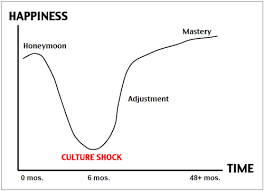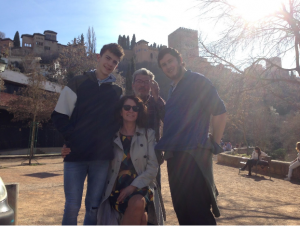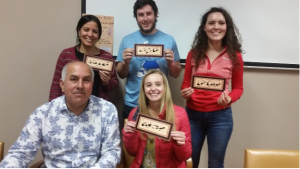Author: Garrett Gilmartin
Location: Granada, Spain
Pronouns: He/Him/His
Anyone who has travelled, whether it be from one state to another or one country to another, knows that seeing new plants, people, or buildings can be breathtaking. This was my experience arriving in Spain. Of course, I had some nerves because I did not know anyone in my program. There are other students from Valpo within the program but I knew as much about them as I did everyone else I met upon arrival. Nerves aside, I was extremely excited to be able to use Spanish in a setting other than a classroom.
Culture shock was a big topic before leaving the U.S. and throughout orientation here in Spain. This trip was not the first time I had travelled outside of the United States, so I did not understand the idea of culture shock. It did not make sense to me as I love to absorb information on other cultures, religions, and people, and could not imagine feeling uncomfortable in an environment rich with information for me to absorb. I was wrong… Moreover, despite the mini courses and orientation I went through, I still feel as though culture shock is nothing like what I was told to expect.
I was told that culture shock, without the fancy dictionary definition, was essentially feeling a mixture of homesickness, loneliness, and uncomfortability. That was without a doubt spot on to how I felt when culture shock set in. What was surprising was exactly when the shock set in. My director here in Spain told me once that she had seen charts showing a vague timeline for how one should or might feel while studying abroad or spending a large duration of time in different country, however, she has observed that instead of one large dip in the chart, where student’s feelings of loneliness kick in, there are often two dips before returning home which students are not ready for.

The first is soon after arrival, when it sinks in that the student really is abroad and cannot just call up their friends to go out anymore.This dip in comfortability is often accounted for in standard charts. The second is about half way through the program (in my case a semester) when culture shock hits the hardest because the mix of excitement to go home and hearing from family and friends how things are happening and changing without the student being there can make them feel like they are missing out. This second dip in emotion is the surprising one. Personally, at this point I felt so detached from the life I knew back in the U.S. but also not a perfect fit for Spain. For me this was like losing a sense of belonging to anywhere.
How I dealt with culture shock might not be a perfect fit for others, but (logically) my solution for not feeling like I had a home was to make one. Obviously, I could not try to rebuilt that feeling with Valpo or the Chicagoland area because that is not where I am. So, I really focused on the opportunities in front of me. My host family is wonderful.

I have a host mother and father as well as a host brother who is fifteen, which is actually quite unusual. Most host “families” here consist of a host mother and possibly her grown children who visit now and again. Anyway, that’s just the immediate family that I live with in Granada. There is an older daughter and an older son who have moved out. The daughter comes back to visit often and the son owns one of two total bars in a small mountain town in the region Alpujarras. We often go to visit him on the weekends to help with the bar and get some work done on my host father’s farm. These weekend trips and being able to help with some work has made me feel like part of the family. I am even getting to know many other people who live in the town.
The reality is that everyone experiences culture shock or deals with culture shock differently, but hopefully I can prepare others a little bit more for their trips abroad by revealing how I dealt with it. Other ways to build a family like setting here is to be brave and make friends in and out of one’s program, as I have in Alpujarras and Granada.

Leave a Reply